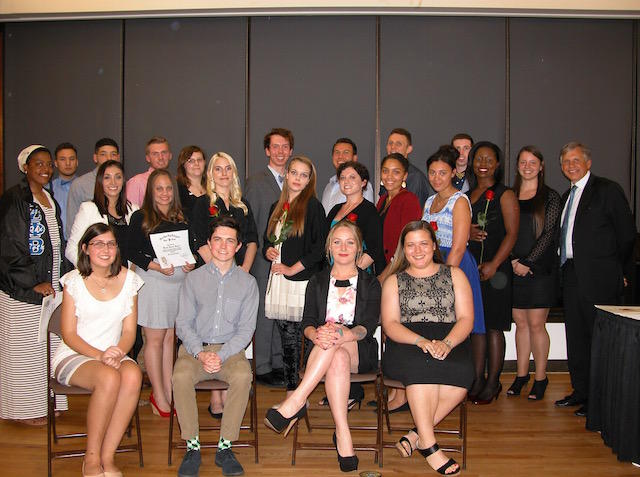
Beta Beta Beta
Beta Beta Beta (TriBeta) is a national honor society for students, particularly undergraduates, dedicated to improving the understanding and appreciation of biological study and extending boundaries of human knowledge through scientific research. Since its founding in 1922, more than 200,000 persons have been accepted into lifetime membership, and more than 430 chapters have been established throughout the United States and Puerto Rico.
Questions about membership can be addressed to Dr. Amber Rock, Faculty Sponsor of UNCP's Psi Lambda Chapter of TriBeta. The local chapter was adopted as a result of a student effort led by Biology major, Susan Severson.

Biology Club
The Biology Club is open to UNCP students who have a genuine interest in the natural sciences. Students who join are typically Biology majors, but a major in Biology is not a prerequisite. Club members participate in various field trips, roadside cleanups, fund-raising activities, and charitable causes, such as volunteer work at the Carnivore Preservation Trust. Past field trips include: kayak/canoe trips to Huggins Island and on the Lumber River, visiting the aquarium at Pine Knoll Shores, visiting Alligator Adventure, and camping at Cheraw State Park. The Club has membership in the North Carolina Academy of Science. Dr. Maria Santisteban is the Club's Faculty Sponsor, and Dr. John Roe is the Faculty Co-sponsor.
Science Education Club
The Science Education Club is a professional organization open to all UNCP students who are interested in science education and teaching at any level (pre K- college). Club members can become affiliated with regional and national professional organizations such as the North Carolina Science Teachers Association (NCSTA), the National Science Teachers Association (NSTA), and/or the National Association of Biology Teachers (NABT). Activities include participating and/or presenting at regional and national conferences, guest speakers and workshops, field trips to natural areas, and benefits of the national organizations such as journals and online teaching resources. For more information and science education teaching resources, click the link below. Dr. Rita Hagevik is the Club’s Faculty Sponsor and Prof. Mary Ash and Dr. Brian Postek are the Club’s Co-sponsors.
Professional Societies
American Educational Research Association
The American Educational Research Association (AERA), founded in 1916, is concerned with improving the educational process by encouraging scholarly inquiry related to education and evaluation and by promoting the dissemination and practical application of research results. AERA is the most prominent international professional organization, with the primary goal of advancing educational research and its practical application. Its more than 25,000 members are educators; administrators; directors of research; persons working with testing or evaluation in federal, state and local agencies; counselors; evaluators; graduate students; and behavioral scientists. The broad range of disciplines represented by the membership includes education, psychology, statistics, sociology, history, economics, philosophy, anthropology, and political science. The annual meeting of this organization is held in the spring. Dr. Rita Hagevik is a member of this organization.
American Society for Cell Biology
The American Society for Cell Biology is an international society that promotes the field of cell biology, by way of scholarly research presentations at its annual and summer meetings and by way of its publications. Dr. Maria Santisteban is a member of the society.
American Society for Microbiology
The American Society for Microbiology is a leading scientific society for people interested in the field of microbiological sciences. By advancing knowledge in the field, the society seeks to both improve the understanding of life processes and to disseminate this information, thereby contributing to improvements in environmental, economic and health conditions globally.
Drs. Marilu Santos and Maria Santisteban are members of the society.
Genetics Society of America
The Genetics Society advocates research, communication and education in the field of genetics, partly by way of several scholarly conferences and its journal. Dr. Maria Santisteban is a member of the society.
National Association for Research in Science Teaching
The National Association for Research in Science Teaching is an international organization for improving teaching and learning through research. Since its inception in 1928, NARST has promoted research in science education and the communication of knowledge generated by the research. The ultimate goal of NARST is to help all learners achieve science literacy. The annual meeting of this organization is held in the spring. Dr. Rita Hagevik is a member of this organization.
National Science Teachers Association
The National Science Teachers Association is an international organization with state level affiliates such as the North Carolina Science Teachers Association. NSTA is an organization of more than 55,000 dedicated science teachers, science supervisors, administrators, scientists, and business and industry representatives committed to promoting excellence and innovation in science teaching and learning for all. Meetings are held in the November in Greensboro (state level), fall and spring (regional meetings) and in April (national meeting). Dr. Rita Hagevik, Prof. Mary Ash, and Dr. Brian Postek are members.
North American Association of Environmental Education
Do you teach others about the environment? Do you lead environmental lessons in an elementary or high-school classroom, a university, or in a park, museum, or nature center? NAAEE is the membership association for all of us who help others learn about the environment. This international organization, which includes Canada and Mexico, holds a research and national conference each year in the fall. Dr. Rita Hagevik is a member of this association.
The North Carolina Academy of Science
The North Carolina Academy of Science is now over 100 years old. The Academy has memberships for both undergraduate students and faculty. Annual meetings provide an excellent introduction to scientific meetings as well as the opportunity to meet other scientists and students, and to present research in either poster or oral presentation formats. Currently Drs. Kelly, Santisteban, and Zeigler are faculty members of this organization.
The Association of Southeastern Biologists
This regional professional society provides a good introduction to a variety of scientists and research. Several members of the faculty and some of our students are members, and several attend the annual meeting in April.